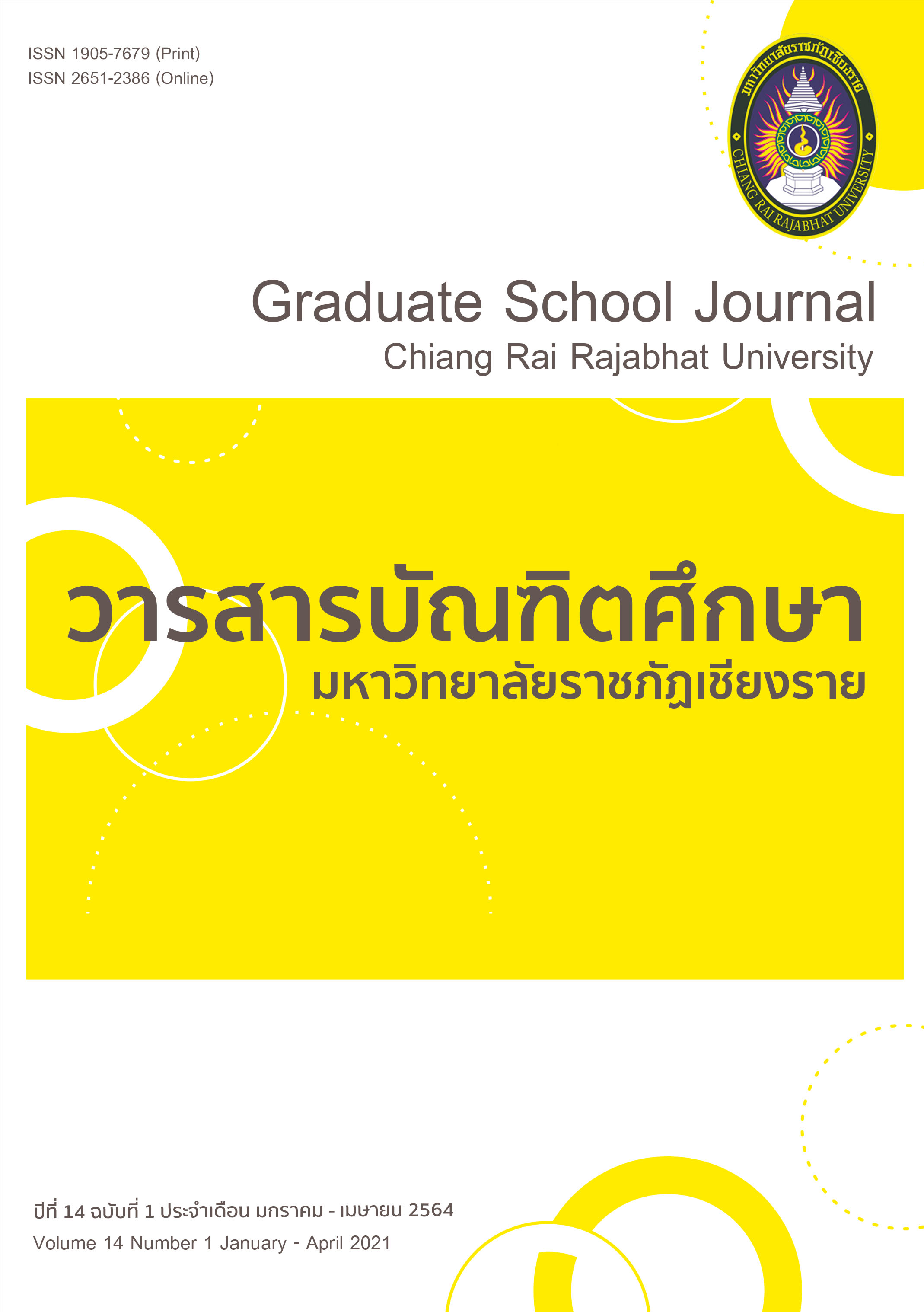ปัจจัยเชิงสาเหตุและผลลัพธ์ของความอ่อนล้าทางอารมณ์ของเภสัชกรโรงพยาบาล เขตภาคกลาง
Main Article Content
บทคัดย่อ
เภสัชกรเป็นหนึ่งในอาชีพผู้ให้บริการแก่ผู้ป่วยในเรื่องการจ่ายยาและแนะนำวิธีการใช้ยา ซึ่งถือว่าเป็นอาชีพที่มีบทบาทสำคัญในหน่วยงานด้านการแพทย์ การศึกษานี้มีวัตถุประสงค์เพื่อ 1) ศึกษาอิทธิพลของความก้าวร้าวของลูกค้าที่ส่งผลต่อความอ่อนล้าทางอารมณ์ ความไม่สอดคล้องในการแสดงความรู้สึกและสุขภาวะของเภสัชกรโรงพยาบาล 2) ศึกษาอิทธิพลของความไม่สอดคล้องในการแสดงความรู้สึกที่ส่งผลต่อความอ่อนล้าทางอารมณ์และสุขภาวะของเภสัชกรโรงพยาบาล และ 3) ศึกษาอิทธิพลของความอ่อนล้าทางอารมณ์ที่ส่งผลต่อสุขภาวะของเภสัชกรโรงพยาบาล งานการศึกษานี้เป็นการวิจัยเชิงปริมาณโดยใช้แบบสอบถามเป็นเครื่องมือวัด กลุ่มตัวอย่าง คือ เภสัชกรโรงพยาบาลรัฐบาลและเอกชนบริเวณภาคกลางในประเทศไทย จำนวน 380 คน ผลการวิจัยพบว่า มีการยอมรับ 6 สมมติฐานที่ตั้งไว้ คือ 1) ความก้าวร้าวของลูกค้ามีความสัมพันธ์เชิงลบกับสุขภาวะของเภสัชกรโรงพยาบาล 2) ความก้าวร้าวของลูกค้ามีความสัมพันธ์เชิงบวกกับความอ่อนล้าทางอารมณ์ของเภสัชกรโรงพยาบาล 3) ความก้าวร้าวของลูกค้ามีความสัมพันธ์เชิงบวกกับความไม่สอดคล้องในการแสดงความรู้สึกของเภสัชกรโรงพยาบาล 4) ความไม่สอดคล้องในการแสดงความรู้สึกมีความสัมพันธ์เชิงบวกกับความอ่อนล้าทางอารมณ์ของเภสัชกรโรงพยาบาล 5) ความไม่สอดคล้องในการแสดงความรู้สึกมีความสัมพันธ์เชิงลบกับสุขภาวะของเภสัชกรโรงพยาบาล และ 6) ความอ่อนล้าทางอารมณ์มีความสัมพันธ์เชิงลบกับสุขภาวะของเภสัชกรโรงพยาบาลผลการวิเคราะห์โมเดลสมการโครงสร้างจากการใช้โปรแกรม AMOS มีค่าผลของโมเดลที่เหมาะสมดีซึ่งเป็นข้อมูลเชิงประจักษ์ คือ CMIN/df = 2.328, RMR = 0.049, GFI = 0.960, CFI = 0.914, SRMR = 0.000, RMSEA = 0.045 ประโยชน์ที่ได้จากการศึกษาสามารถเป็นแนวทางให้ผู้บริหารหรือฝ่ายทรัพยากรมนุษย์นำไปใช้ในการพัฒนาสุขภาวะและธำรงรักษาบุคคลากรด้านเภสัชกรในโรงพยาบาล
Article Details
บทความที่ได้รับการตีพิมพ์เป็นลิขสิทธิ์ของวารสารมหาวิทยาลัยราชภัฎเชียงราย
ข้อความที่ปรากฏในบทความแต่ละเรื่องในวารสารวิชาการเล่มนี้เป็นความคิดเห็นส่วนตัวของผู้เขียนแต่ละท่านไม่เกี่ยวข้องกับมหาวิทยาลัยราชภัฎเชียงราย และคณาจารย์ท่านอื่นๆในมหาวิทยาลัยฯ แต่อย่างใด ความรับผิดชอบองค์ประกอบทั้งหมดของบทความแต่ละเรื่องเป็นของผู้เขียนแต่ละท่าน หากมีความผิดพลาดใดๆ ผู้เขียนแต่ละท่านจะรับผิดชอบบทความของตนเองแต่ผู้เดียว
เอกสารอ้างอิง
เทื้อน ทองแก้ว. (2553). การมีหัวใจบริการ (Service Mind). สืบค้นเมื่อ 11 กรกฏาคม 2563, จาก http://wahnwanz.blogspot.com/2010/01/service-mind.html
บุญชม ศรีสะอาด. (2545). การวิจัยเบื้องต้น. กรุงเทพฯ: สุวีริยาสาส์น.
สภาเภสัชกรรมแห่งประเทศไทย. (2563). รายชื่อเภสัชแต่ละจังหวัด. สืบค้นเมื่อ 11 กรกฏาคม 2563, จาก https://pharmacycouncil.org/index.php?option=com_pharmacist_list_province
อภิชัย มงคล และ คนอื่น ๆ. (2550). การพัฒนาและทดสอบดัชนีชี้วัดสุขภาพจิตคนไทย. กรุงเทพฯ: กรมสุขภาพจิต กระทรวงสาธารณสุข.
Afsar, B., Cheema, S. and Masood, M. (2017). The role of emotional dissonance and emotional intelligence on job-stress, burnout and well-being among nurses. International Journal of Information Systems and Change Management, 9(2), 87-105.
Akkawanitcha, C., Patterson, P., Buranapin, S., et al. (2015). Frontline employees’ cognitive appraisals and well-being in the face of customer aggression in an Eastern, collectivist culture. Journal of Services Marketing, 29(4), 268-279.
Alorani, O. I. and Alradaydeh, M. F. (2017). Depression, aggression and spiritual well-being among the university students in Jordan. European Scientific Journal, 13(2), 269-280.
Alrawadieh, Z., Cetin, G., Dincer, M. Z., et al. (2020). The impact of emotional dissonance on quality of work life and life satisfaction of tour guides. The Service Industries Journal, 1(1), 50-64.
Byrne, B. M. (2010). Structural equation modeling with AMOS : Basic concepts, applications, and programming (2nd ed.). New York: Taylor & Francis Group. 7384.
Chu, K. H. and Murrmann, S. K. (2006). Development and validation of the hospitality emotional labor scale. Tourism Management, 27(1), 1181-1191.
Cronbach, L. J. (1951). Coefficient Alpha and the internal structure of test. Psychometrik, 16(1), 297-334.
Diamantopoulos, A. and Siguaw, J. A. (2000). Introduction to LISREL : A guide for the uninitiated. London: SAGE Publications.
Fiabane, E., Dordoni, P., Setti, I., et al. (2019). Emotional dissonance and exhaustion among healthcare professionals : The role of the perceived quality of care. International Journal of Occupational Medicine and Environmental Health, 32(6), 841-851.
Gilardi, S., Guglielmetti, C., Converso, D., et al. (2019). Third-party aggression and emotion work. International Journal of Stress Management, 13(1), 1-40.
Han, N. Y., Kang, M. Y. and Park, S. B. (2020). The effects of customer rude behaviors on organizational deviance, life violations, and creativity using emotional dissonance and job stress as mediators. Management & Information Systems Review, 39(2), 126-143.
Hinkle, D. E., Wiersma, W. and Jurs, S. G. (1998). Correlation: a measure of relationship. Applied statistics for the behavioral sciences, 4(1), 105-131.
Jeon, L., Buettner, C. K. and Grant, A. A. (2018). Early childhood teachers’ psychological well-being : Exploring potential predictors of depression, stress, and emotional exhaustion. Early education and development, 29(1), 53-69.
Karatepe, O. M. (2011). Customer aggression, emotional exhaustion, and hotel employee outcomes : A study in the United Arab Emirates. Journal of Travel & Tourism Marketing, 28(1), 279-295.
Kline, R. B. (2011). Principles and practice of structural equation modeling (3rd ed). New York: Guilford Press.
Looff, P. D., Nijman, H., Didden, R., et al. (2018). Burnout symptoms in forensic psychiatric nurses and their associations with personality, emotional intelligence and client aggression : A cross-sectional study. Journal of Psychiatric and Mental Health Nursing, 25(1), 506-516.
Maslach, C. and Jackson, S. E. (1981). The measurement of experienced burnout. Journal of Occupational Behaviour, 2(1), 99-113.
Tepper, B. J. (2000). Consequence of abusive supervision. Academy of Management Journal, 43(1), 178-190.
Velotti, P., Garofalo, C., Bottazzi, F., et al. (2017). Faces of shame : Implications for self-esteem, emotion regulation, aggression, and well-being. The journal of Psychology, 151(2), 171-184.
Zhong, M. (2019). Emotional dissonance, emotional exhaustion and work-family conflict : A study of college teachers in China. (Doctoral dissertation), Iscte – University Institute of Lisbon.


